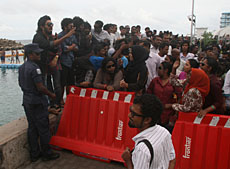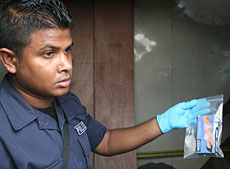Maldivian youth need sex education and access to reproductive health services, given high numbers of unsafe abortions, rising infanticide, as well as increasing risk factors that contribute to the spread of sexually transmitted infections and HIV/AIDS, a Department of National Planning study has found.
The study examined how much human development progress has been achieved in the Maldives in terms of population and development, reproductive health and rights, gender equity, equality and empowerment of women as well as education during the period 1994 – 2012.
The thematic Programme of Action (PoA) goals were established during the 1994 Cairo International Conference on Population and Development (ICPD) and adopted by 179 participating governments, including the Maldives. Thus, the “Maldives Operational Review for the ICPD Beyond 2014” study was conducted under the supervision of the Department of National Planning (DNP) in collaboration with the United Nations Population Fund (UNFPA).
Overall the study found that the Maldives has “accomplished remarkable progress” in achieving the ICPD PoA goals, with “impressive advancements in all development areas… and notable achievements in sexual and reproductive health.”
However young people and women continue to lack access to quality services, particularly in regard to sexual and reproductive health, which is putting their health at risk.
Youth comprise the largest population group in the Maldives and “[with] the number of young people entering their reproductive years on the rise, special attention to ensure that adolescents and youth are provided with sufficient knowledge about their anatomies, sexual and reproductive health, contraceptives and sexually transmitted diseases is needed,” stated the study.
“Access to contraceptives is limited to the married population despite overwhelming empirical evidence suggesting the need to provide contraceptive information and access to the youth population,” the study noted.
“Information must also be provided on the risks of getting pregnant in young age and of unsafe abortion,” the report continued.
“Simultaneously, it is also essential to establish more comprehensive and confidential reproductive health services which are more accessible and affordable,” the study found.
The report repeatedly noted that although information regarding reproductive health, HIV and sexually transmitted infections (STIs) are technically “available to everyone regardless of age, gender and marital status…access to reproductive health services are still limited to the married population.”
However, even the married population is not always ensured access to accessible, affordable and confidential reproductive health services, according to the study’s findings.
Contraceptive use among married couples is “relatively low”, with “Only 27 percent of married women using modern methods”.
“With regard to reproductive rights, men often control decisions regarding women’s reproductive health, often based on religious and cultural grounds,” the report noted.
“[Furthermore,] the sudden growth of religious fundamentalism and conservative thinking is an emerging challenge, particularly for women and young girls,” the study stated. “There have been increase towards certain trends such as preference for home schooling and refusing vaccination and other medical services for women based on religious beliefs.”
Sex, drugs, and reproductive rights
The report highlighted the “clear indicators of the imperative need to provide access to information on sexual reproductive health and reproductive health services to the sexually active adolescents and youth population.”
High numbers of unsafe abortions – mostly through injections and pills – were noted as “one of the main causes of preventable maternal deaths in the country.”
Infanticide also appears to be increasing, as demonstrated by media reports of “several new born babies and few premature babies found in parks and/or buried in secluded places and/ or thrown into the sea,” said the report.
 “These are clear indications for the need of life skills programmes and reproductive health education,” the study suggested. “Access and utilisation of contraceptives to avoid unwanted pregnancies must also be advocated to minimise these issues.”
“These are clear indications for the need of life skills programmes and reproductive health education,” the study suggested. “Access and utilisation of contraceptives to avoid unwanted pregnancies must also be advocated to minimise these issues.”
The lack of reproductive health rights and services for women and girls have also lead to observed increases in non-communicable diseases such as breast cancer and cervical cancers, according to the study.
Meanwhile, male reproductive health issues are often ignored, while “family planning and use of contraception is largely considered a woman’s responsibility.” Therefore, the study recommended strengthening awareness information and access to male reproductive health services.
In order to create the awareness needed about reproductive rights and reproductive health, the report suggested using “Carefully targeted programmes using innovative and youth friendly tools such as social media and text messaging.”
An interrelated issue includes widespread drug use and substance abuse among Maldivian youth, with cases reported to the Maldives Police Services increasing from 195 cases in 2001 to 1,160 cases in 2010, noted the study.
“The high level of drug usage coupled with the increase in commercial sex workers imposes great risks for HIV/AIDS and other sexually transmitted infections and reproductive tract infections,” said the report.
The lack of sexual reproductive health access and awareness combined with risk factors including sharing needles to inject drugs, sexual activities among adolescents and youth, extramarital sex, and commercial sex workers, “could contribute to an increase in the incidence and prevalence of STIs and HIV/AIDS,” the study found.
“It is therefore crucial to educate the population on the risks of STI’s and HIV/AIDS through carefully designed behavioural change communication strategies,” the report recommended. “It is equally important to promote awareness on the availability of voluntary counseling and testing services and contraceptives such as condoms in Male’ and in regional level.”
The report recommended giving special consideration to “identify these high risks groups and provide them with the necessary information, treatment and services.”
Age appropriate sexual and reproductive health education needs to taught in schools to combat the increasing “sexual health illnesses” in the Maldives, according to the Centre for Community Health and Disease Control (CCHDC).
In 2012, CCHDC’s Public Health Programme Coordinator Nazeera Nazeeb revealed that studies have found high risk behaviors – including “unprotected sex, drug and alcohol abuse, homosexuality and prostitution” – are putting young people at high risk of sexually transmitted diseases and HIV.
 (0)Dislikes
(0)Dislikes (0)
(0)

